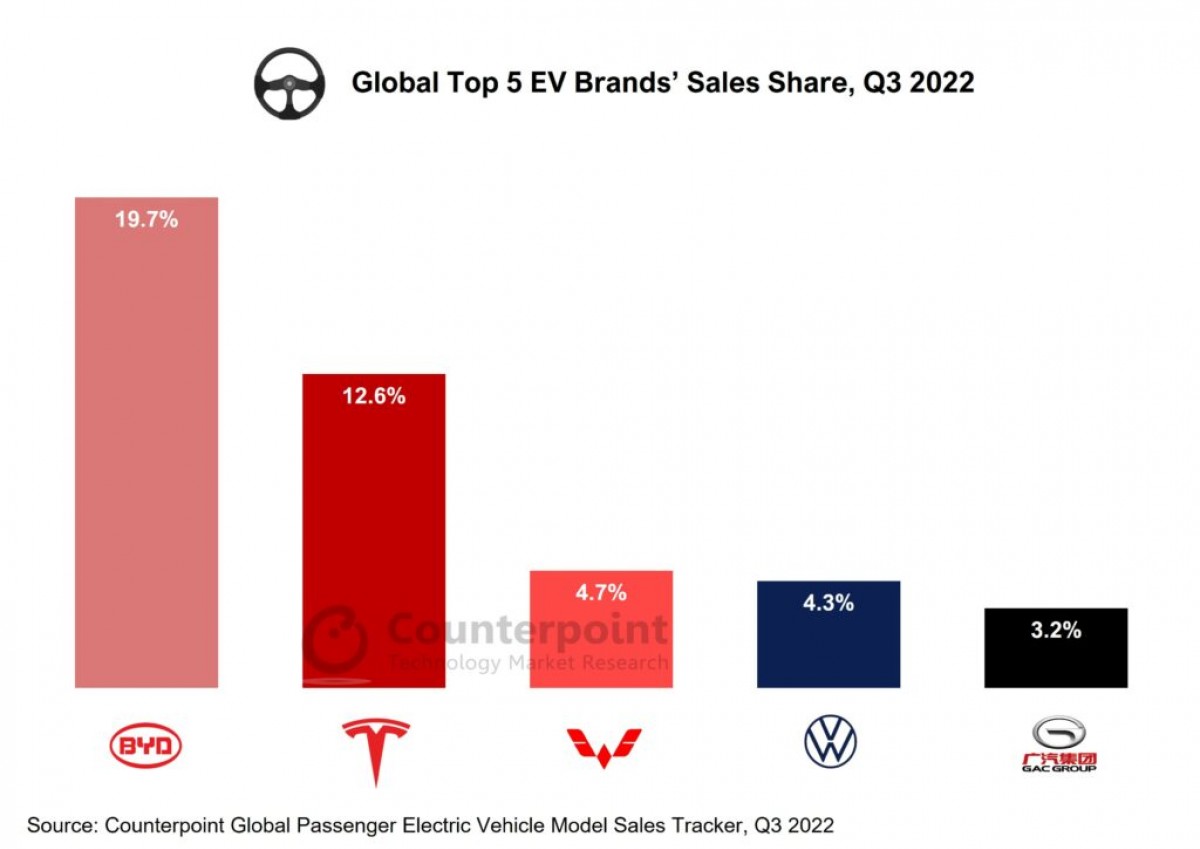Brazil's EV Market Shift: BYD's Expansion And Ford's Shrinking Footprint

Table of Contents
BYD's Rapid Growth in Brazil's EV Market
BYD's success in Brazil is a compelling case study in how to effectively penetrate a developing EV market. Their strategy hinges on two key pillars: strategic investments and aggressive pricing, coupled with a popular model range that resonates with Brazilian consumers.
Strategic Investments and Aggressive Pricing
BYD's strategic investment in Brazil is multifaceted. They've established manufacturing facilities, contributing to local job creation and reducing reliance on imports. This localized production directly impacts their pricing strategy, allowing them to offer competitive EVs compared to established brands like Volkswagen and Chevrolet.
- Factory Locations and Capacity: BYD has invested heavily in establishing a significant manufacturing presence in Brazil, details of which are still emerging but are expected to significantly boost production capacity in the coming years.
- Competitive Pricing: BYD leverages its manufacturing base and economies of scale to undercut competitors. Specific model pricing comparisons reveal a significant price advantage, making their EVs more accessible to a wider range of Brazilian consumers. This competitive pricing, coupled with government incentives, is a crucial driver of their market penetration.
- Government Incentives: BYD has successfully leveraged government incentives designed to boost the adoption of electric vehicles in Brazil. These incentives, including tax breaks and subsidies, make their vehicles even more attractive to buyers.
Popular Model Range and Consumer Appeal
BYD's success isn't solely due to price. Their range of EV models offers features and technology that appeal to the Brazilian consumer.
- Specific Model Names and Sales Figures: Models like the BYD Tang and BYD Han have seen strong sales figures, indicating a clear consumer preference. Specific sales data will be incorporated here as it becomes available.
- Key Features Driving Sales: Advanced battery technology, robust safety features, and stylish design are all contributing factors to their popularity. Consumers appreciate the long-range capabilities and the sophisticated technology integrated into these vehicles.
- Consumer Reviews and Sentiment Analysis: Positive consumer reviews and social media sentiment analysis further underscore the appeal of BYD's offerings in the Brazilian market. The brand is gaining a reputation for reliability and value, crucial for success in a price-sensitive market.
Ford's Retreat from Brazil's EV Market
In stark contrast to BYD's expansion, Ford's presence in Brazil's EV market is shrinking. This reflects a broader global strategy shift and highlights the challenges faced by established automakers in a rapidly changing landscape.
Global Strategy Shift and Market Challenges
Ford's decision to reduce its footprint in Brazil is part of a larger global restructuring. This strategic retreat involves scaling back operations and focusing resources on more profitable markets. Several challenges contributed to this decision:
- Scaling Back of Operations: Specific details on Ford's reduced presence will be incorporated here, including plant closures and workforce reductions.
- Reasons Behind their Strategy: Profitability issues in the Brazilian market, coupled with the significant investment required for a successful EV transition, are key factors behind Ford's decision. Global market pressures also played a significant role.
- Lack of Dedicated EV Models: The absence of a dedicated, competitive range of electric vehicles tailored specifically for the Brazilian market has hampered Ford's ability to compete effectively with rivals.
Lack of Investment and Competition
Ford's limited investment in EV technology and infrastructure in Brazil compared to competitors further exacerbates their situation.
- Comparison of Ford's R&D Spending: A comparison of Ford's R&D spending on electric vehicle technology against competitors like BYD will highlight the disparity in investment.
- Lack of Charging Infrastructure Support: Insufficient investment in charging infrastructure reinforces the challenges faced by Ford in supporting its limited EV offerings.
- Market Share Comparison: Ford's declining market share compared to other brands clearly indicates the severity of their challenges in the Brazilian automotive market.
The Broader Implications for Brazil's EV Future
The contrasting fortunes of BYD and Ford point to a larger shift in Brazil's EV future. Government policies, infrastructure development, and the rise of Chinese EV brands will continue to shape the market.
Government Policies and Infrastructure Development
Government policies play a crucial role in fostering EV adoption.
- Specific Government Initiatives: Details of tax breaks, subsidies, and other governmental incentives will be added here.
- Progress in Charging Infrastructure: The progress (or lack thereof) in deploying charging stations across Brazil will be analyzed, including coverage in urban and rural areas.
- Potential Future Policy Changes: Analysis of future policy changes that might impact the development of Brazil's EV market is included.
The Rise of Chinese EV Brands in Brazil
The success of BYD signifies a broader trend: Chinese EV brands are gaining significant market share in Brazil.
- Examples of Other Chinese Brands: Mentioning other Chinese EV brands entering the Brazilian market and their strategies helps understand the overall trend.
- Competitive Advantages: Analyzing the competitive advantages of these brands, such as pricing, technology, and government support, provides a clear understanding of their success.
- Potential Future Market Dominance: An assessment of the potential for Chinese EV brands to dominate the Brazilian EV market in the coming years.
Conclusion
The Brazilian EV market is dynamic and competitive. BYD's rapid expansion showcases the potential for successful entry through strategic investment and competitive pricing. Ford's withdrawal, on the other hand, highlights the challenges of adapting to the changing landscape. The future of Brazil's EV market depends significantly on government policies, infrastructure development, and the continued influx of Chinese EV brands. To stay ahead in this rapidly evolving sector, continuous monitoring of Brazil's EV market trends and developments is essential. To learn more about the latest updates in Brazil's electric vehicle market, explore our regularly updated resources.

Featured Posts
-
 From Repetitive Scatological Texts To Engaging Podcast The Power Of Ai
May 13, 2025
From Repetitive Scatological Texts To Engaging Podcast The Power Of Ai
May 13, 2025 -
 Stuttgart Open Ostapenkos Stunning Win Against Sabalenka
May 13, 2025
Stuttgart Open Ostapenkos Stunning Win Against Sabalenka
May 13, 2025 -
 Myanmar Sanctions Examining The Uk And Australias Strategic Objectives
May 13, 2025
Myanmar Sanctions Examining The Uk And Australias Strategic Objectives
May 13, 2025 -
 Gibraltar Sovereignty Starmers No Surrender Stance Amidst Renewed Tensions
May 13, 2025
Gibraltar Sovereignty Starmers No Surrender Stance Amidst Renewed Tensions
May 13, 2025 -
 Doom The Dark Ages What We Know So Far About The Release
May 13, 2025
Doom The Dark Ages What We Know So Far About The Release
May 13, 2025
